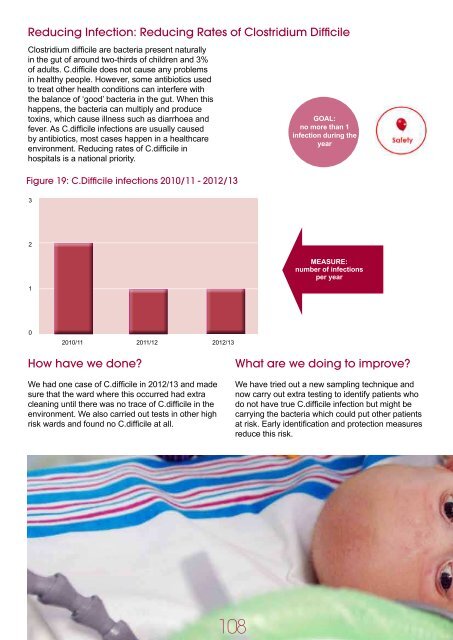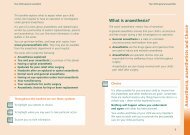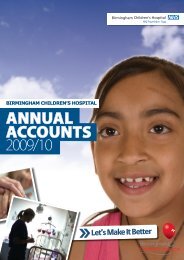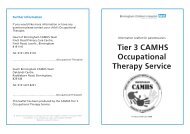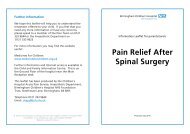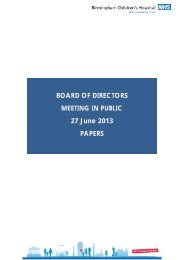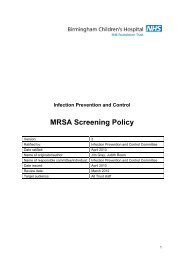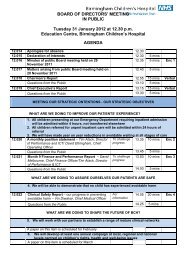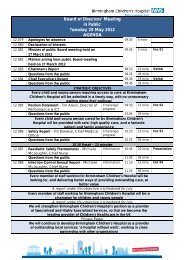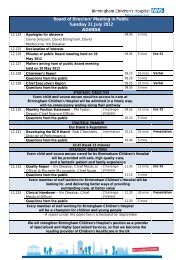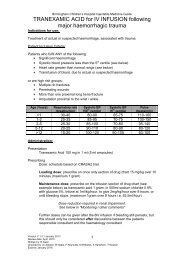Nurses Day! - Birmingham Children's Hospital
Nurses Day! - Birmingham Children's Hospital
Nurses Day! - Birmingham Children's Hospital
You also want an ePaper? Increase the reach of your titles
YUMPU automatically turns print PDFs into web optimized ePapers that Google loves.
108 109<br />
Reducing Infection: Reducing Rates of Clostridium Difficile<br />
Clostridium difficile are bacteria present naturally<br />
in the gut of around two-thirds of children and 3%<br />
of adults. C.difficile does not cause any problems<br />
in healthy people. However, some antibiotics used<br />
to treat other health conditions can interfere with<br />
the balance of ‘good’ bacteria in the gut. When this<br />
happens, the bacteria can multiply and produce<br />
toxins, which cause illness such as diarrhoea and<br />
fever. As C.difficile infections are usually caused<br />
by antibiotics, most cases happen in a healthcare<br />
environment. Reducing rates of C.difficile in<br />
hospitals is a national priority.<br />
Figure 19: C.Difficile infections 2010/11 - 2012/13<br />
3<br />
GOAL:<br />
no more than 1<br />
infection during the<br />
year<br />
Reducing Infection: Preventing MRSA<br />
Blood stream infections with MRSA can be very<br />
serious for people who are unwell and can result<br />
in additional treatment and an increased length of<br />
stay.<br />
Figure 20: MRSA infections 2007/08 - 2012/13<br />
3<br />
2<br />
1<br />
BACK TO CONTENTS PAGE<br />
GOAL:<br />
maintain a<br />
zero level<br />
of MRSA<br />
MEASURE:<br />
number of infections<br />
per year<br />
2<br />
1<br />
MEASURE:<br />
number of infections<br />
per year<br />
0<br />
2007/08 2008/09 2009/10 2010/11 2011/12 2012/13<br />
How have we done?<br />
For the second year in a row we have had no<br />
MRSA infections at all.<br />
0<br />
2010/11 2011/12 2012/13<br />
How have we done?<br />
We had one case of C.difficile in 2012/13 and made<br />
sure that the ward where this occurred had extra<br />
cleaning until there was no trace of C.difficile in the<br />
environment. We also carried out tests in other high<br />
risk wards and found no C.difficile at all.<br />
What are we doing to improve?<br />
We have tried out a new sampling technique and<br />
now carry out extra testing to identify patients who<br />
do not have true C.difficile infection but might be<br />
carrying the bacteria which could put other patients<br />
at risk. Early identification and protection measures<br />
reduce this risk.<br />
What are we doing to improve?<br />
Achieving this goal has been a challenge in<br />
2012/13, particularly with some patients who are<br />
at very high risk of MRSA bacteraemia. We will<br />
continue to practice everything we have learned<br />
that has ensured that we have had no MRSA<br />
infections since 2010, and we will continue to<br />
apply new best practice and learning from other<br />
organisations.


